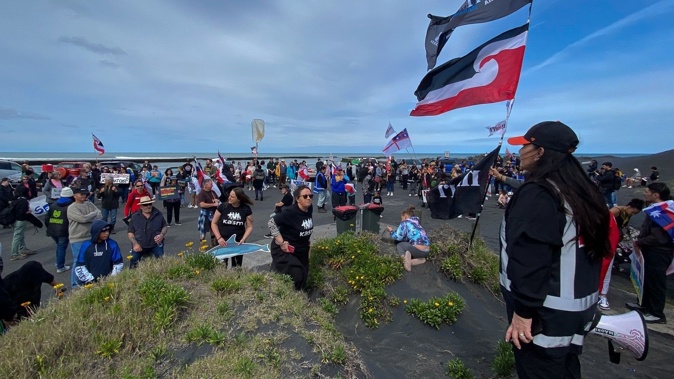

An Australian company has slowed its fast-track bid to mine the Taranaki seabed by failing to provide information demanded by officials.
Officials have picked an expert panel to decide if Trans-Tasman Resources gets the green light to mine in the South Taranaki Bight under the Fast-Track Approvals Act.
Announcing the five experts, associate panel convener Jennifer Caldwell wrote that a “cynical” approach by the would-be miners meant the process would take longer.
“The applicant’s responses to some of my directions have provided little, if any assistance, and have in fact led to my taking a more conservative approach to timeframe,” she said.
The panel will start work in on August 25, sit for 130 working days and give their verdict in March next year.
Caldwell wrote that Trans-Tasman Resources suggested the panel would need just 76 working days, saying any longer would be useless as there was “little room for real debate”.
“The applicant’s memo records its somewhat cynical expectation that: ‘opponents who are invited to comment are very likely to raise any and every issue that they think may impede the project, regardless of merit’.”
“I infer from both the substance and tone of the memorandum that the applicant considers any effort spent or additional time allocated towards issue resolution is pointless.”
Trans-Tasman Resources – a wholly-owned subsidiary of Australian gold and silver miners Manuka Resources – wants to suck up 50 million tonnes of the seabed every year for at least 20 years.
After extracting ore containing iron, titanium and vanadium, it would spit 45 million tonnes of sediment back into the waters of the Pātea Shoals.
Trans-Tasman fought with opponents in an earlier fast-track conference over the miner’s lack of engagement with mana whenua since first applying to mine 12 years ago, Caldwell said.
“The Supreme Court made very clear the relevance of tikanga and found that the decision issued on the 2016 application failed to effectively grapple with the true effect of the proposal for iwi parties, amongst other related findings.”
Trans-Tasman Resources managing director Alan Eggers told New Plymouth District Council (NPDC) in June the company had engaged with local iwi, taking into account their concerns “as best we understand them”.
“We’re going to be working with South Taranaki iwi when we get our consents, whether they want us or not,” he said.
 Alan Eggers heads Trans-Tasman Resources, which told fast-track officials there is "little room for real debate" on their proposed seabed mine. Photo / Te Korimako o Taranaki
Alan Eggers heads Trans-Tasman Resources, which told fast-track officials there is "little room for real debate" on their proposed seabed mine. Photo / Te Korimako o Taranaki
A week later, NPDC joined the South Taranaki and Whanganui district councils in declaring opposition to seabed mining.
The company has been approached for comment.
Caldwell said iwi authorities and Treaty settlement entities – and the hapū and iwi they represent – had fought the application through a decade of court cases, alongside Marine Area Coastal Act claimants and other parties.
“[They] have continued to express concerns with the proposal and its impact on the environment and their cultural values and interests.
“All those parties expect to participate in this application via the invitation-to-comment process,” Caldwell wrote.
“I strongly recommend that the applicant commence engagement with the local authorities, relevant agencies, iwi authorities and Treaty settlement entities.”
The panel will be led by lawyer Kit Toogood, KC, an arbitrator, investigator and legal adviser.
Environmental commissioner and lawyer Loretta Lovell was nominated by local authorities and specialises in energy and resource management, also sitting on several iwi boards.
Dr Hilke Giles is a coastal and systems scientist, Gavin Kemble a planner and expert witness and Natalie Hampson an economic consultant with a master’s science degree in geography.
Caldwell is a lawyer of 30 years’ experience and a senior partner at Buddle Findlay, specialising in resource management, environmental and local government law.
She said many invited specialists would advise on things like sediment plume modelling, commercial and customary fisheries, local tikanga and mātauranga, and international law.
“The complex suite of conditions required for the approvals sought will require significant attention from the Expert Panel and that effort should not be underestimated.”
LDR is local body journalism co-funded by RNZ and NZ On Air.
Take your Radio, Podcasts and Music with you









